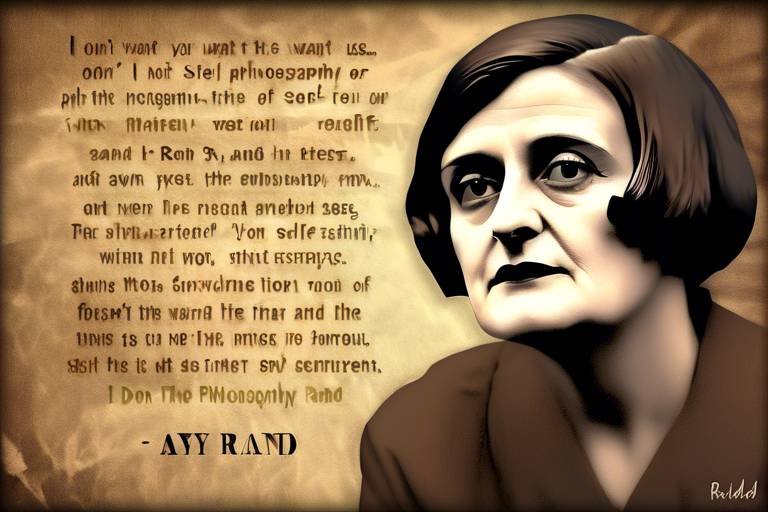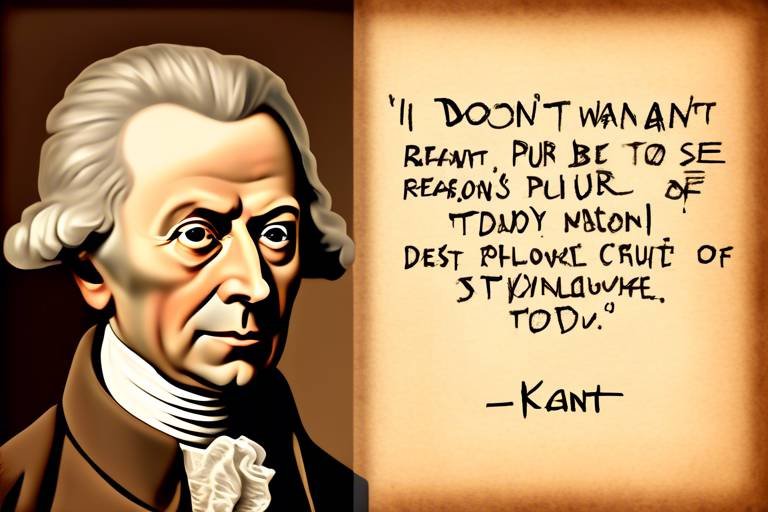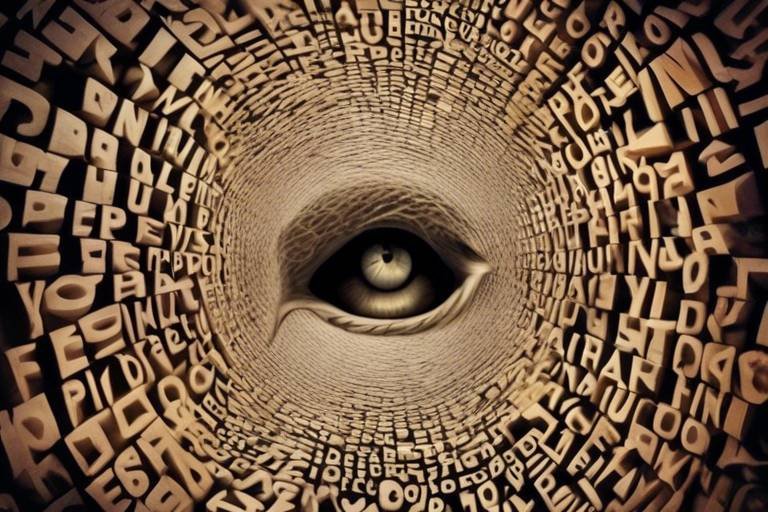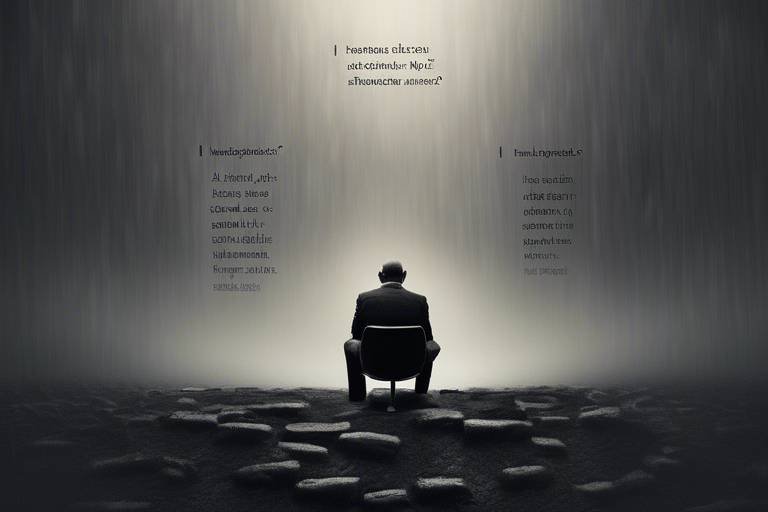The Philosophy of Oppression - A Critical Overview
Oppression is a term that evokes strong emotions and deep reflections. It’s not just a word; it’s a reality that has shaped human history and continues to influence our societies today. In this article, we will embark on a journey to explore the complex nature of oppression through various philosophical lenses, unearthing its historical roots, societal implications, and the ethical considerations that arise from understanding and combating oppressive systems. By diving into this critical overview, we aim to shed light on how oppression manifests in different forms and the moral imperatives that compel us to act against it.
To grasp the full scope of oppression, it's essential to look back at its historical foundations. Throughout the ages, various events and ideologies have contributed to the establishment and perpetuation of oppressive practices. From ancient civilizations that enslaved entire populations to modern-day systemic injustices, the roots of oppression run deep. For instance, the transatlantic slave trade is a stark reminder of how racial oppression was institutionalized and normalized. Additionally, the colonization of nations often involved the subjugation of indigenous peoples, stripping them of their rights and cultures.
Understanding these historical contexts is crucial because they inform our current societal structures. It’s like peeling back layers of an onion; each layer reveals more about the injustices that have been woven into the fabric of our societies. By recognizing these patterns, we can better understand the mechanisms of oppression that persist today.
Various philosophical theories provide insights into the nature of oppression, offering frameworks to analyze and understand its complexities. One significant perspective comes from Marxist theory, which posits that oppression is deeply rooted in class struggle. According to Marxists, economic systems play a pivotal role in creating societal inequalities that disproportionately affect marginalized groups. This theory encourages us to examine how power dynamics and economic disparity intertwine, leading to various forms of oppression.
Marxist thought emphasizes the importance of class struggle in understanding oppression. It suggests that the conflict between the bourgeoisie (the ruling class) and the proletariat (the working class) is a driving force behind societal inequalities. This conflict manifests in various ways, including wage disparities, lack of access to resources, and systemic discrimination. The implications of these economic systems are profound, as they create environments where marginalized groups are unable to thrive.
When we delve into the relationship between class struggle and power dynamics, we begin to see how oppression is not merely a personal experience but a societal issue. The interplay between economic disparity and social hierarchy creates a landscape where the powerful maintain their status at the expense of the vulnerable. This power dynamic is akin to a game of chess; each move made by the elite can have devastating consequences for those at the bottom of the hierarchy. Understanding this relationship is crucial for anyone seeking to challenge oppressive systems.
Another critical concept in Marxist thought is alienation. It refers to the disconnection individuals feel from their labor, community, and even themselves due to oppressive systems. Imagine working tirelessly in a factory, producing goods that you will never own, while your labor enriches someone else. This alienation not only strips individuals of their sense of purpose but also perpetuates a cycle of oppression. By analyzing alienation, we can better understand the emotional and psychological toll that oppression takes on individuals and communities.
Feminist philosophy offers another vital perspective on oppression, particularly concerning the unique challenges faced by women. Feminist thinkers have highlighted various forms of gender-based oppression, advocating for social change and equality. From the suffragette movement to contemporary discussions on reproductive rights, feminism has continually sought to address the systemic barriers that women encounter. It’s not just about achieving equality; it’s about dismantling the patriarchal structures that perpetuate oppression.
Addressing oppression raises significant ethical questions that challenge our moral compass. What responsibilities do individuals and societies have in combating oppressive systems? This is where the conversation shifts from understanding oppression to actively engaging in social justice movements. The moral imperative to act is strong, as inaction often perpetuates the status quo. It’s essential to recognize that our choices, big or small, can contribute to either the perpetuation or the dismantling of oppression.
Individual and collective responsibility plays a crucial role in challenging oppression. It’s not enough to simply acknowledge that oppression exists; we must actively engage in efforts to combat it. Whether through advocacy, education, or direct action, every effort counts. It’s like being part of a relay race; each participant must pass the baton effectively to ensure that the race toward justice continues. The ethical implications of our actions are profound, as they can either reinforce oppressive systems or contribute to their dismantling.
Intersectionality provides a framework for understanding how different forms of oppression intersect and overlap. Recognizing that individuals can experience multiple, simultaneous forms of oppression is crucial for addressing the complexities of social justice. For instance, a woman of color may face both racial and gender-based oppression, which cannot be understood in isolation. By acknowledging these overlapping identities, we can develop more inclusive and effective strategies for combating oppression.
- What is oppression? Oppression refers to systemic and institutionalized injustices that marginalize certain groups, often based on race, gender, class, or other identities.
- How can we combat oppression? Combating oppression requires active engagement, education, and advocacy to challenge and dismantle oppressive systems.
- What is intersectionality? Intersectionality is a framework that examines how different forms of oppression intersect and affect individuals based on their multiple identities.

Historical Context of Oppression
Understanding the historical foundations of oppression is crucial for comprehending its evolution. Throughout history, various events and ideologies have shaped and perpetuated oppressive practices, creating a complex tapestry of social injustice that continues to affect marginalized communities today. From the ancient empires to modern-day systems, oppression has taken on many forms, often justified by prevailing social norms and economic structures. For instance, the rise of feudalism in medieval Europe established a rigid class hierarchy that subjugated serfs, while colonialism expanded these oppressive practices globally, leading to the exploitation of countless cultures and societies.
To grasp the full scope of oppression, we must also consider the ideological justifications that have enabled it. The concept of manifest destiny in the United States, for example, was used to rationalize the displacement of Native American tribes, framing it as a divine right rather than an act of violence. Similarly, the notion of racial superiority has underpinned slavery and segregation, embedding systemic racism into the fabric of society. These ideologies do not merely reflect societal views; they actively shape laws, policies, and individual behaviors, creating a cycle of oppression that can be difficult to dismantle.
Moreover, the intersection of various forms of oppression, such as race, gender, and class, highlights the need for a nuanced understanding of historical context. For example, the suffrage movement in the early 20th century fought for women's rights but often sidelined the voices of women of color, illustrating how different identities experience oppression in distinct ways. This historical oversight continues to resonate today, as movements for social justice strive to include intersectional perspectives that acknowledge and address these complexities.
In examining the historical context of oppression, we can identify several key periods and events that have significantly impacted societal structures:
| Period/Event | Description | Impact |
|---|---|---|
| Ancient Civilizations | Establishment of class systems and slavery | Created lasting hierarchies and social stratification |
| Colonialism | Exploitation of colonized nations and peoples | Resulted in cultural erasure and economic disparity |
| Industrial Revolution | Rise of capitalism and labor exploitation | Increased class struggle and worker alienation |
| Civil Rights Movement | Fight against racial segregation and discrimination | Highlighted systemic racism and led to significant legal reforms |
As we reflect on these historical contexts, it becomes evident that oppression is not merely a relic of the past; it is a living reality that continues to evolve. The lessons learned from history are vital in informing our current understanding of oppression and our responses to it. By recognizing the historical roots of oppression, we can better equip ourselves to challenge and dismantle these systems in our contemporary world.
- What is oppression? Oppression refers to the systematic and pervasive mistreatment of individuals or groups, often based on race, gender, class, or other identity markers.
- How does history influence current oppression? Historical events and ideologies shape societal structures and norms that perpetuate oppression, making it essential to understand their origins to address contemporary issues.
- What can individuals do to combat oppression? Individuals can educate themselves, engage in activism, and support marginalized communities to challenge oppressive systems effectively.

Philosophical Theories on Oppression
When we dive into the realm of , we uncover a rich tapestry of thought that spans centuries and cultures. These theories provide us with vital insights into the mechanisms of oppression and how they shape human experiences. From the intricate dynamics of power to the subtle nuances of identity, various philosophers have attempted to dissect and understand the multifaceted nature of oppression. Each theory offers a unique lens through which we can analyze the world around us, and in doing so, they challenge us to question our own roles within these systems.
One of the most prominent frameworks comes from the Marxist perspective, which posits that oppression is fundamentally tied to class struggle. According to Marxist theory, the capitalist system creates inherent inequalities that lead to the exploitation of the working class by the bourgeoisie. This economic disparity not only manifests in wealth but also in access to resources, education, and political power. As we explore this theory, it's essential to consider how economic systems perpetuate societal inequalities and the implications this has for marginalized groups. In essence, Marxist thought encourages us to examine the interplay between economic disparity and social hierarchy, revealing how class struggle is a driving force behind many oppressive structures.
Another critical aspect of Marxist theory is the concept of alienation. This notion refers to the disconnection individuals feel from their labor, community, and even themselves. In a capitalist society, workers often become mere cogs in a machine, stripped of their individuality and creativity. This alienation not only affects their sense of self but also perpetuates oppression by making it difficult for individuals to unite against their oppressors. As we delve deeper into this idea, we see that alienation is not just a personal experience; it is a societal issue that fosters an environment where oppression can thrive.
Moving beyond Marxism, we encounter feminist theories that address the unique forms of oppression faced by women. Feminist philosophy highlights how gender-based oppression intersects with various social structures, creating a complex web of inequality. Different feminist thinkers have contributed to this discourse, advocating for social change and the dismantling of patriarchal systems. For instance, liberal feminism focuses on achieving equality through legal reforms, while radical feminism seeks to challenge the very foundations of patriarchy. By examining these diverse feminist perspectives, we gain a deeper understanding of how gender influences experiences of oppression and the necessity for inclusive approaches to social justice.
As we navigate through these philosophical theories, it's crucial to recognize that oppression is not a monolithic experience. The intersectionality framework, introduced by scholars like Kimberlé Crenshaw, emphasizes how various forms of oppression—such as race, gender, and class—intersect and compound one another. This perspective encourages us to consider the overlapping identities individuals hold and how these intersections can lead to unique experiences of oppression. By acknowledging intersectionality, we can better address the complexities of social justice and ensure that our efforts are comprehensive and inclusive.
In conclusion, exploring philosophical theories on oppression not only enriches our understanding of the world but also empowers us to take action. By examining the historical context, economic systems, and gender dynamics involved, we can begin to challenge and dismantle oppressive structures. The journey towards justice is ongoing, and it requires a collective effort to engage with these theories and apply their insights in our daily lives.
- What is oppression? Oppression refers to the systemic and pervasive discrimination or mistreatment of individuals or groups based on characteristics such as race, gender, class, or sexual orientation.
- How do philosophical theories help in understanding oppression? Philosophical theories provide frameworks to analyze the roots and implications of oppression, offering insights that can inform social justice efforts.
- What is intersectionality? Intersectionality is a concept that examines how different forms of oppression overlap and interact, highlighting the complexity of individual experiences.
- Why is it important to study the history of oppression? Understanding the historical context of oppression allows us to recognize patterns and structures that continue to affect marginalized groups today.

Marxist Perspectives
Marxist theory posits that the roots of oppression lie deep within the fabric of class struggle. At its core, this perspective emphasizes that economic systems are not just frameworks for trade and labor; they are also the very structures that perpetuate inequality and exploitation. Imagine a vast stage where the wealthy few control the script, while the majority—the working class—plays their roles without a say in the plot. This stark division creates a societal landscape where oppression is not merely an unfortunate side effect, but a fundamental component of the economic engine that drives capitalism.
To understand how oppression manifests through this lens, we must first explore the relationship between class struggle and power dynamics. In a capitalist society, the ruling class, or bourgeoisie, holds the majority of resources and decision-making power. Conversely, the proletariat, or working class, often finds itself in a precarious position, fighting for fair wages, better working conditions, and basic rights. This struggle is not just a battle for economic survival; it's a fight against a system designed to keep them in a state of subjugation. The power dynamics at play create a cycle of oppression, where the rich get richer, and the poor remain trapped in a cycle of poverty.
One of the most compelling aspects of Marxist thought is the concept of alienation. Alienation occurs when individuals become disconnected from their labor, their products, and their communities. Picture a factory worker who spends hours assembling products that they will never own or use. This disconnection not only diminishes their sense of self-worth but also contributes to a broader experience of oppression. Workers are reduced to mere cogs in a machine, stripped of their humanity and agency. The emotional and psychological toll of this alienation is profound, as it breeds feelings of powerlessness and despair.
As we dive deeper into the Marxist critique of oppression, we can identify several key elements that illustrate how economic systems contribute to societal inequalities:
- Exploitation: The capitalist system thrives on the exploitation of labor, where workers are paid less than the value they produce, enriching the bourgeoisie at their expense.
- Commodification: In a capitalist society, everything, including human labor, is treated as a commodity, reducing intrinsic human value to mere market value.
- Class Consciousness: A crucial aspect of overcoming oppression is the development of class consciousness among the proletariat, leading to collective action against oppressive structures.
In summary, Marxist perspectives offer a powerful lens through which to analyze the complex nature of oppression. By understanding the interplay between class struggle, power dynamics, and alienation, we can begin to grasp the profound implications of economic systems on marginalized groups. This insight is not just academic; it serves as a call to action, urging us to recognize and challenge the structures that perpetuate oppression in our societies.

Class Struggle and Power Dynamics
The concept of class struggle is at the heart of Marxist theory, serving as a lens through which we can understand the intricate dance of power dynamics in society. At its core, class struggle refers to the ongoing conflict between different classes, primarily the bourgeoisie (the ruling class) and the proletariat (the working class). This struggle is not merely a historical phenomenon; it is a continuous process that shapes our social fabric and influences our daily lives.
To illustrate this, think of society as a grand stage where various actors play their roles. The bourgeoisie, with their wealth and resources, often control the script, dictating terms and conditions that favor their interests. Meanwhile, the proletariat, despite being the backbone of production, frequently find themselves relegated to the sidelines, struggling for recognition and fair treatment. This imbalance creates a power dynamic that is both pervasive and deeply entrenched.
One of the most striking aspects of class struggle is how it manifests in different forms of oppression. For instance, economic disparities lead to social hierarchies, where access to education, healthcare, and even basic human rights becomes a privilege reserved for the few. The table below highlights some key aspects of how class struggle influences power dynamics:
| Aspect | Bourgeoisie | Proletariat |
|---|---|---|
| Control of Resources | Holds majority of wealth | Limited access to resources |
| Political Influence | Dominates political landscape | Minimal representation |
| Social Mobility | High opportunities for advancement | Barriers to upward mobility |
As we delve deeper into these power dynamics, it becomes evident that oppression is not just a byproduct of economic inequality; it is also a means of maintaining control. The ruling class often employs various strategies to suppress dissent and maintain their status quo. This can include manipulating media narratives, influencing educational curricula, or even enacting policies that disproportionately affect marginalized communities.
Moreover, the intersection of class struggle with other forms of oppression—such as race, gender, and sexuality—complicates the landscape even further. For example, a working-class woman of color may face multiple layers of oppression that stem not only from her economic status but also from her gender and race. This reality highlights the importance of recognizing that power dynamics are not one-dimensional; they are a complex web of interrelated factors that require a nuanced understanding.
In conclusion, the relationship between class struggle and power dynamics is a critical area of study for anyone interested in understanding the roots of oppression. By analyzing how economic disparities contribute to social hierarchies, we can better comprehend the mechanisms that perpetuate inequality. Ultimately, recognizing these dynamics is the first step toward challenging and dismantling oppressive systems, paving the way for a more equitable society.
- What is class struggle? Class struggle refers to the conflict between different social classes, particularly between the ruling class and the working class, over resources and power.
- How does class struggle relate to oppression? Class struggle often leads to systemic oppression, where the ruling class maintains control over resources and power, marginalizing the working class.
- Why is understanding power dynamics important? Understanding power dynamics helps us identify the root causes of inequality and oppression, allowing us to advocate for social justice and change.

Alienation and Oppression
Alienation is a profound concept in Marxist thought that goes beyond mere separation; it encapsulates the emotional and psychological disconnection individuals experience within oppressive systems. At its core, alienation occurs when people become estranged from their labor, their community, and ultimately, themselves. Imagine being a cog in a vast machine, where your contributions are reduced to mere numbers on a spreadsheet, devoid of any personal significance. This is the essence of alienation, and it is intricately linked to oppression in ways that can be both subtle and overt.
The relationship between alienation and oppression can be dissected into several layers. When individuals are alienated from their work, they often feel powerless, as if their efforts are inconsequential. This sense of powerlessness can lead to a cycle of oppression, where marginalized groups are further exploited. For instance, consider workers in a factory who toil long hours under harsh conditions, yet receive minimal compensation. They may feel alienated not only from their labor but also from their coworkers, who are often pitted against each other in a struggle for survival. This division fosters an environment where solidarity is weakened, making it easier for oppressive systems to thrive.
Furthermore, alienation extends beyond the workplace. In a society that prioritizes profit over people, individuals may find themselves disconnected from their communities and social networks. This disconnection can manifest in various ways, such as a lack of trust among neighbors or a diminished sense of belonging. When people feel isolated, they are less likely to organize and resist oppressive practices. The psychological toll of alienation can lead to feelings of hopelessness and despair, which are precisely what oppressive systems rely on to maintain control.
To illustrate the impact of alienation, consider the following table that outlines the key differences between connectedness and alienation in the context of oppression:
| Aspect | Connectedness | Alienation |
|---|---|---|
| Work Environment | Collaborative, supportive | Competitive, isolating |
| Community Engagement | Active participation | Withdrawal from social activities |
| Sense of Purpose | Fulfilled and valued | Disengaged and undervalued |
The implications of alienation are vast. It not only affects individual well-being but also has broader societal consequences. When people feel disconnected from their labor and communities, they are less likely to challenge the status quo. This is why understanding the dynamics of alienation is essential for those seeking to combat oppression. By fostering environments that promote connection and solidarity, we can begin to break down the barriers that alienation erects.
In conclusion, the interplay between alienation and oppression is a critical aspect of understanding how oppressive systems operate. Recognizing the signs of alienation can empower individuals and communities to reclaim their sense of agency and fight against the structures that seek to diminish their worth. As we engage in this struggle, we must remember that true liberation begins with reconnecting with ourselves, our labor, and each other.
- What is alienation in the context of oppression?
Alienation refers to the emotional and psychological disconnection individuals experience within oppressive systems, often leading to feelings of powerlessness and isolation. - How does alienation contribute to oppression?
Alienation can weaken solidarity among marginalized groups, making it easier for oppressive systems to exploit and control individuals. - What can be done to combat alienation?
Fostering environments that promote connection, community engagement, and a sense of purpose can help combat alienation and empower individuals to resist oppression.

Feminist Theories
Feminist theories represent a rich tapestry of ideas and perspectives that seek to unravel the complexities of gender-based oppression. At its core, feminism challenges the societal norms that have historically marginalized women and other gender minorities. It's not merely about advocating for women's rights; it’s about transforming the very structures that perpetuate inequality. Feminist theorists argue that oppression is not a monolithic experience but rather a multifaceted phenomenon influenced by various factors such as race, class, and sexuality.
One of the foundational ideas in feminist theory is the concept of patriarchy, which refers to the systemic dominance of men in both public and private spheres. This patriarchal structure creates a hierarchy that privileges male experiences while devaluing those of women. Feminist philosophers like Simone de Beauvoir and Judith Butler have critically examined how these power dynamics shape societal expectations and individual identities. For instance, de Beauvoir famously stated, "One is not born, but rather becomes, a woman," highlighting how gender roles are socially constructed rather than biologically predetermined.
Furthermore, feminist theories can be categorized into several distinct waves, each addressing the unique challenges of their time:
- First Wave Feminism: Focused primarily on legal issues and inequalities, such as suffrage and property rights.
- Second Wave Feminism: Expanded its focus to include issues like reproductive rights, workplace equality, and sexual liberation.
- Third Wave Feminism: Emphasized diversity and individualism, recognizing that women's experiences are shaped by race, class, and sexuality.
- Fourth Wave Feminism: Often associated with digital activism, it addresses issues like sexual harassment and body positivity through online platforms.
Each wave has built upon the previous one, creating a dynamic dialogue that continues to evolve. In the contemporary landscape, feminist theories also intersect with other social justice movements, recognizing that oppression is not experienced in isolation. For example, the concept of intersectionality, coined by Kimberlé Crenshaw, emphasizes how various forms of discrimination overlap, affecting individuals in unique ways. By acknowledging these intersections, feminist theories advocate for a more inclusive approach to social justice that addresses the needs of all marginalized groups.
Ultimately, feminist theories not only critique the status quo but also offer pathways for social change. They encourage individuals to question their own privileges and biases while fostering solidarity among diverse groups. Whether through grassroots activism, academic inquiry, or everyday conversations, feminism remains a powerful force in the ongoing struggle for equality. As we reflect on these theories, it becomes clear that understanding and combating oppression is not just a theoretical exercise; it is a moral imperative that requires action from all of us.
Q: What is the main goal of feminist theories?
A: The primary goal of feminist theories is to understand and challenge the various forms of gender-based oppression and to advocate for equality and justice for all genders.
Q: How do feminist theories differ from each other?
A: Feminist theories differ in focus and approach, with some emphasizing legal rights, others addressing cultural norms, and some exploring the intersections of gender with race, class, and sexuality.
Q: What is intersectionality?
A: Intersectionality is a framework that examines how various social identities (such as race, gender, and class) intersect to create unique experiences of oppression and privilege.
Q: Can men be feminists?
A: Yes, men can be feminists. Feminism advocates for the dismantling of patriarchal structures, which benefits everyone, including men, by promoting equality and social justice.

Ethical Considerations in Oppression
When we dive into the murky waters of oppression, we can't help but encounter a plethora of ethical dilemmas. These dilemmas challenge us to reflect on our moral compass and the responsibilities we hold, not just as individuals, but as members of a broader society. Have you ever stopped to think about what it truly means to stand against oppression? It's not just about shouting slogans or sharing posts on social media; it's about understanding the depth of our involvement and the impact of our actions—or inactions.
At the heart of these ethical considerations lies a fundamental question: What is our responsibility when we witness oppression? This question can feel overwhelming, but it’s essential to break it down. We must consider both individual and collective actions. For instance, individuals can engage in various forms of activism, from educating themselves and others to participating in protests or supporting marginalized communities. On a collective level, societies must work towards dismantling oppressive structures that perpetuate inequality. This dual approach emphasizes that change is not only possible but necessary.
Moreover, the concept of intersectionality adds another layer to our ethical considerations. Intersectionality examines how overlapping identities—such as race, gender, class, and sexuality—interact to create unique experiences of oppression. Recognizing these intersections is crucial for understanding the multifaceted nature of oppression. For example, a Black woman may face both racial and gendered oppression, which cannot be adequately addressed by focusing on just one aspect of her identity. Thus, ethical action requires a nuanced understanding of these complexities.
To illustrate this point, let’s consider a few key ethical responsibilities that arise in the context of oppression:
- Awareness: Acknowledging the existence of systemic oppression is the first step. This means educating ourselves about the histories and experiences of marginalized groups.
- Advocacy: Once we understand the issues, we must advocate for those who are oppressed. This can involve amplifying their voices and supporting their causes.
- Accountability: It’s essential to hold ourselves and others accountable for actions that perpetuate oppression, whether intentional or not.
Incorporating these responsibilities into our daily lives can lead to meaningful change. However, it’s important to remember that ethical engagement is not a one-time event; it’s an ongoing process that requires commitment and reflection. As we navigate this journey, we must ask ourselves: Are we willing to challenge our own biases and privilege? This self-reflection is crucial in fostering a more just and equitable society.
In conclusion, the ethical considerations surrounding oppression compel us to act. Whether it’s through individual efforts or collective movements, each step we take can contribute to dismantling oppressive systems. As we ponder these responsibilities, let’s remember that the fight against oppression is not just a social obligation; it’s a moral imperative that calls for courage, compassion, and a relentless pursuit of justice.
- What is oppression? Oppression is the systemic and pervasive nature of social inequality that is maintained by societal structures, policies, and practices.
- How can I get involved in combating oppression? You can start by educating yourself, supporting marginalized communities, and participating in local advocacy efforts.
- What does intersectionality mean? Intersectionality is a framework that examines how various social identities intersect and contribute to unique experiences of oppression and privilege.
- Why is ethical responsibility important in the context of oppression? Ethical responsibility encourages individuals and societies to actively challenge and dismantle oppressive systems, fostering a more equitable world.

Responsibility and Action
When we talk about responsibility in the context of oppression, it’s essential to understand that it extends beyond mere acknowledgment. It's about recognizing our role in challenging the systems that perpetuate inequality. Have you ever thought about how your everyday choices can either contribute to or combat oppression? This isn’t just a philosophical musing; it’s a call to action. Each of us has a part to play in dismantling oppressive structures, whether they manifest in our workplaces, communities, or even within our own families.
To effectively engage in this struggle, we must first examine our own biases and privileges. This self-reflection is not a comfortable journey, but it is a necessary one. By understanding our positions within societal hierarchies, we can better empathize with those who face systemic oppression. It's like being in a crowded theater: if you’re sitting in the front row, you may not see the struggles of those in the back. Only when we shift our perspective can we truly grasp the full picture of injustice.
Moreover, the ethical implications of our actions cannot be overstated. We have a moral obligation to not only speak out against oppression but also to take tangible steps towards creating a more equitable society. This might include:
- Participating in local activism and community organizing.
- Supporting businesses and organizations that prioritize social justice.
- Educating ourselves and others about the histories and experiences of marginalized groups.
Each of these actions contributes to a larger movement for change. It’s not enough to simply express outrage; we must channel that energy into meaningful action. Think of it as planting seeds in a garden. Each small act of resistance can grow into something much larger, creating a vibrant ecosystem of support and justice.
Collectively, we can amplify our voices. Social media has become a powerful tool in this fight, allowing us to share stories, mobilize support, and hold those in power accountable. However, we must also be cautious. The digital landscape can sometimes dilute our messages or lead to performative activism, where the focus is more on appearances than genuine change. True responsibility means being intentional about our engagement and ensuring that our actions align with our values.
Ultimately, the fight against oppression is not a solitary journey; it is a collective endeavor. By standing together and holding each other accountable, we can create a ripple effect that challenges the status quo. Remember, every action counts. Whether it’s educating yourself, advocating for policy changes, or simply having difficult conversations, you have the power to make a difference. So, what will you do today to challenge oppression and promote justice?
- What does it mean to take responsibility in combating oppression? Taking responsibility means acknowledging your role in societal structures and actively participating in efforts to challenge and change these systems.
- How can I educate myself about oppression? You can read books, attend workshops, follow activists on social media, and engage in discussions that focus on the experiences of marginalized communities.
- Is online activism effective? Online activism can be effective for raising awareness and mobilizing support, but it should be complemented by offline actions and genuine engagement with communities.
- What are some practical steps I can take to support social justice? You can volunteer with local organizations, donate to causes that fight oppression, and use your voice to advocate for policy changes that promote equity.

Intersectionality and Ethics
When we dive into the concept of intersectionality, we're not just scratching the surface of oppression; we're peeling back layers of complexity that reveal how various identities intersect to shape individual experiences. Coined by legal scholar Kimberlé Crenshaw, intersectionality examines how different aspects of a person's identity—such as race, gender, class, and sexuality—overlap and interact, creating unique dynamics of privilege and oppression. Imagine a tapestry woven from diverse threads: each thread represents a different identity, and where they intertwine, they create both strength and vulnerability.
Understanding intersectionality is crucial for addressing the ethical implications of oppression. It challenges us to recognize that not all individuals experience oppression in the same way. For instance, a woman of color may face both racial and gender discrimination, which cannot be fully understood by examining either category in isolation. This duality highlights the ethical responsibility we have to consider the multifaceted nature of identity when fighting against systemic injustices.
Moreover, intersectionality compels us to ask critical questions about our own positions within these systems. Are we aware of the privileges we hold that may shield us from certain forms of oppression? Are we actively listening to and amplifying the voices of those who experience compounded discrimination? These inquiries are not merely academic; they are ethical imperatives that demand our attention and action.
To illustrate the importance of intersectionality in ethical discussions, consider the following scenarios:
- A white woman may face sexism in the workplace, but she may not encounter the same level of racial bias as a Black woman in the same environment.
- A gay man may experience homophobia, but his experiences may differ significantly from those of a transgender woman who also faces gender-based violence.
These examples underscore the necessity of a nuanced approach to ethics in social justice movements. We cannot afford to adopt a one-size-fits-all strategy; instead, we must tailor our efforts to address the specific needs of marginalized groups based on their intersecting identities. This means advocating for policies that recognize and support these complexities, ensuring that no voice is left unheard.
In conclusion, intersectionality is not just a theoretical framework; it is a vital lens through which we must view ethics in the context of oppression. By acknowledging and addressing the overlapping identities that contribute to individual experiences of discrimination, we can foster a more inclusive and just society. This ethical commitment requires us to engage with empathy, challenge our biases, and work collaboratively towards dismantling oppressive systems. Only then can we hope to create a world where everyone, regardless of their intersecting identities, can thrive.
- What is intersectionality? Intersectionality is a framework for understanding how various aspects of a person's identity, such as race, gender, and class, intersect to create unique experiences of oppression and privilege.
- Why is intersectionality important in discussions about ethics? It helps us recognize that individuals face multiple, overlapping forms of discrimination, which informs a more nuanced and effective approach to social justice.
- How can I apply intersectionality in my activism? Consider the diverse identities within marginalized communities and advocate for policies that address the specific needs of those who experience compounded oppression.
Frequently Asked Questions
- What is oppression?
Oppression refers to the systemic and pervasive mistreatment or exploitation of individuals or groups, often based on characteristics such as race, gender, class, or sexuality. It manifests through social, economic, and political structures that disadvantage certain groups while privileging others.
- How has oppression evolved throughout history?
The evolution of oppression is deeply rooted in historical contexts. From colonialism to industrial capitalism, various ideologies and events have shaped the practices of oppression. Understanding these historical foundations helps us recognize the patterns of inequality that persist today.
- What are some philosophical perspectives on oppression?
Philosophical perspectives on oppression vary widely. Marxist theories emphasize class struggle and economic systems, while feminist theories focus on gender-based oppression. Each perspective offers unique insights into the nature of oppression and its societal implications.
- How do Marxist theories explain oppression?
Marxist theories suggest that oppression stems from class struggles, where the ruling class exploits the working class. This economic disparity creates power dynamics that perpetuate social inequalities, leading to the marginalization of certain groups.
- What is the relationship between alienation and oppression?
Alienation, a key concept in Marxist thought, refers to the disconnection individuals feel from their labor and communities. This disconnection can intensify the experience of oppression, as it separates individuals from the very essence of their work and social interactions.
- How do feminist theories address oppression?
Feminist theories analyze the unique forms of oppression that women face, advocating for social change and equality. These theories highlight the importance of understanding gender-based injustices and the need for intersectional approaches to combat them.
- What ethical considerations arise when discussing oppression?
Addressing oppression raises crucial ethical questions about individual and collective responsibilities. It compels us to consider our roles in combating oppressive systems and promoting justice, emphasizing the need for active engagement in social justice movements.
- What is intersectionality, and why is it important?
Intersectionality is a framework that examines how different forms of oppression intersect and impact individuals with overlapping identities. Recognizing these intersections is vital for understanding the complexities of oppression and addressing the unique challenges faced by marginalized groups.



















